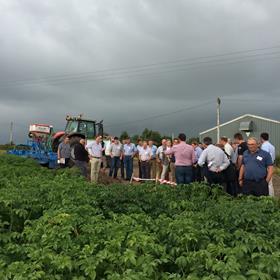
Remember the earthy, fragrant taste of fresh new potatoes from your parents’ allotment? Or were you one of those raised on a diet of clinically clean and sparkling packaged spuds?
A group of growers believe they can help boost the wider potato category by reverting to the new potato’s flavourful roots and putting regionality and seasonality at the forefront of marketing.
Richard Park, of potato packerE. Park & Sons, is the unofficial head of a growing momentum behind Cheshire Earlies, after he was approached by local Cheshire farmers with concerns about lack of sales. “We are speaking to customers about launching the Cheshire brand,” he says. “We just need to work out how to package it and sell it to customers. How can we market a premium product that is unwashed?”
Park is adamant that Cheshire potatoes should be sold unwashed to minimise the time it takes to get them onto shelves, ensuring they are as fresh as possible. He explains: “If you buy carrots that are dirty they have a unique taste, and it’s the same in new potatoes. Lots of potatoes are now washed; new potatoes used to be straight from the ground. Washed potatoes go through a barrel washer in the factory.
“Cheshire potatoes always used to be sold fresh, whereas now people buy for convenience. So most potatoes are harvested, cooled and stored, and they are not always fresh. And new potatoes also go green quickly in packaging.”
Using unwashed potatoes to promote a unique and satisfying flavour would be key to the Cheshire brand, as Park believes superior taste is what would bring shoppers back. The unwashed potato also looks good in-store, says Park, who adds: “People view and buy with their eyes; visual produce sells better. Retailers are keen, they like having regional produce in store.”
Aside from flavour and retail aesthetics, there is one more reason Cheshire Earlies benefit from not being washed: “The problem we have is the soils we have are quite sandy and don’t lend themselves to washing,” Park points out. “Ideally they need to be marketed in a dirty state.
“The challenge is whether consumers are willing to purchase potatoes that aren’t washed. It’s a difficult one – 95 per cent of potatoes are washed. It’s difficult to produce the same quality in appearance from an unwashed potato.”
Park, whose family business packs potatoes from across the UK as well as Cheshire, said at a recent Potato Council event: “We supply supermarkets in five regions, but when the early Cheshire crop is straight from the ground I’d like to supply more local stores with locally produced product. I’d be supportive of working with local producers to develop a Cheshire potato brand.”
As consumption figures continue to drop like a baked potato hurled from a height, the industry is starting to realise that this is not a trend that’s going to turn around on its own. Park believes one way businesses can slow the decline is more focus on regionality and seasonality in the potato category.
With a season running from the end of May to the end of July, or early August, Cheshire Earlies have their place among the first new potatoes of the English season, but they also have strong regional support – something Park believes could be instrumental in launching the brand and boosting the wider category.
Park says growers have discussed the possibility of applying for protected name status, and there is also a chance that the Potato Council will help fund a campaign to launch Cheshire Early potatoes. But he adds: “It might possibly attract funding from Potato Council, but it will mostly come from ourselves and the growers. It will help the wider potato industry. I just think we have to get people eating potatoes again.”






No comments yet